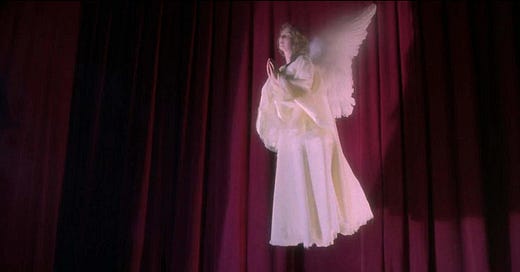My first experience with the work of David Lynch, as is probably common with '80s kids, was Dune. The trailer and the production design had me hyped; the movie, as it was to many, proved a disappointment. I had hoped for a new Star Wars, or at least Flash Gordon; what I got felt as much like a Jesus parable as The Lion, The Witch, and The Wardrobe. At ten years of age, I was going through a sympathy for the bad guys phase, and they seemed to have no chance. Messiah Paul, played by a then-rookie Kyle MacLachlan, was a stiff whose character seemed to have everything handed to him. Given what we know about Lynch now, it's a remarkable miscalculation of tone from a guy who proceeded to nail it every single other time, which is perhaps why it was his only movie that he didn't like.
Dune mainly only works if you know the material, and can see a subtle undercurrent of irony that Dino De Laurentiis presumably tried to stomp out of it in the search for his next big franchise. Unlike Denis Villeneuve's version, the movie does a lot of condensing, and a lot of exposition, but mostly leaves out the part that this is the tale of a false Messiah, and a warning rather than a triumph. That's a balance that the Lynch of 2020 with final cut could have mastered, but in 1984, as a director for hire, he could only suggest it to those who already knew what to see. It was also pretty commonplace for '80s movie heroes to do a lot of killing, and thus harder to read that yes, of course it's bad that a Christ figure is just slaughtering his enemies left and right.
And then he came back with Blue Velvet, which defined his style for the rest of his career as an eternal conflict between the sentimental, superficial American Dream and its dark underbelly simultaneously coexisting. MacLachlan redeemed himself as a more obviously flawed protagonist, the voyeuristic Jeffrey Beaumont, a small-town kid with an unhealthy kink that almost gets him killed when it brings him into contact with folks far more pervy than he. Lynch, as he would continue to do, walks a fine line between irony and sincerity – there's a lot of awkward humor in characters uttering bizarre non sequiturs, yet the sometimes deliberate fakeness of the ideal (embodied by the blatantly mechanical birds nobody seems to notice as such) doesn't detract from the characters' genuine happiness in said ideal. Lynch appears to know that the myth of small-town Americana is exactly that, a false memory of sorts with a real darkside, but a happy dream you can lose yourself in too.
When I recently rewatched Alex Cox's Repo Man, I noted that Lynch didn't necessarily invent this mixture of tones, as most might assume. A lot of '80s directors depicted a comedically broad buy-in to the media image of America as contrasted with its dark side, a timely reflection of actor-turned president Ronald Reagan telling us it was morning in the shining city of America while threatening the world with nuclear weapons and letting gay men die en masse from AIDS.
Heathers' Michael Lehmann is another director who dwelt in that tone; one could make the case that Gregg Araki took the formula and updated it for queer '90s sensibilities. See also Soundgarden's “Black Hole Sun” video. Unlike his peers, though, Lynch mastered and maintained the tone for the rest of his career. Perhaps he did so because he himself felt like a character from it, who lived it, and indeed, by casting himself as FBI boss Gordon in Twin Peaks, he made it so. I never met him, but based on all available footage, it seemed like meeting him was to meet one of his characters. He kept kayfabe, so to speak, and refused to ever explain his films. (The behind-the-scenes documentary on Criterion's Blue Velvet disc is as close as we're ever going to get.)
As Lynch became Acclaimed Director David Lynch, he and those funding him gave himself permission to get weirder and more subconscious. Lost Highway, Mulholland Drive, and Inland Empire form a triptych that gets progressively harder to get a handle on (like many fans, I have my theories), like Twilight Zone episodes from the id whose final twist only a dreaming man understands. When he brought back Twin Peaks with no network TV requirements of comprehensibility or family friendliness, he almost defiantly refused to give audiences the heroic Dale Cooper character they had wanted back, forcing viewers to settle into a different groove with a mentally handicapped “Dougie” instead. The reasoning behind it was pure nightmare logic; the backstory of Killer Bob as embodying an evil that entered our world when the nuclear bomb tore a hole in reality suggests an allusion back to the Reagan-era tonal duality that was formative to Lynch's sensibility.
Lynch could occasionally ooze pure sensitivity – The Elephant Man is unabashedly tragic, and The Straight Story unapologetic sentimentality with only the mildest hint of darkness. In at least three of his movies, the protagonists appear to ascend to Heaven at the end.
Today he followed them. But as he told us from the beginning, in his still-stunning debut film Eraserhead...
“In Heaven, everything is fine. You've got your good thing, and I've got mine.”





Thanks so much for sharing this. It was a great look back on what Lynch meant to you.
(My first exposure? Summer vacation, high school, 2010. Eraserhead at a little past 4 AM, strung out on caffeine. You can imagine.)